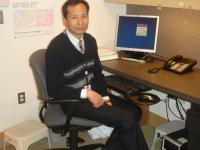You are here
Yuan, Minsheng
 Dr. Yuan finished his medical education and got his PhD from SUMS (Zhongshan University) in China 1995. He did his postdoctoral training at Joslin Diabetes Center 1999-2005. His Science paper 2001 identified NF-kB as central target of high dose Aspirin to reverse insulin resistance and led an inflammatory theory of metabolic syndrome in more than 10 years. He was International Young Researcher’s Aspirin Award winner 2003 and Iacocca fellow at Joslin 2004-2005. He was invited to be the chief of Endocrine department, Professor at Zhongshan University 2006-2009. He was a senior scientist in CHGR, MGH for studying mTOR mediated insulin resistance 2010-2012. During his MGH season he was also a senior manager in Translational Medicine Group, MGH to help develop new drug for treating type 2 diabetes.
Dr. Yuan finished his medical education and got his PhD from SUMS (Zhongshan University) in China 1995. He did his postdoctoral training at Joslin Diabetes Center 1999-2005. His Science paper 2001 identified NF-kB as central target of high dose Aspirin to reverse insulin resistance and led an inflammatory theory of metabolic syndrome in more than 10 years. He was International Young Researcher’s Aspirin Award winner 2003 and Iacocca fellow at Joslin 2004-2005. He was invited to be the chief of Endocrine department, Professor at Zhongshan University 2006-2009. He was a senior scientist in CHGR, MGH for studying mTOR mediated insulin resistance 2010-2012. During his MGH season he was also a senior manager in Translational Medicine Group, MGH to help develop new drug for treating type 2 diabetes.
Dr. Yuan devoted his energy to bridge the gap of medical research between US and China. He started company, Medical and Research Information Consult (MRIC) at this purpose. He collaborated with US-China Chamber of Commerce to promote new healthcare model in China. Dr. Yuan was certified by USMLE/ECFMG 2008, and recently he got his doctor of optometry degree. He will practice primary eye/vision care in Boston area. He will continue to seek new approaches to bring more effectiveness and convenience to future healthcare.
[Abstract] At Universal Village, the intelligent healthcare merges into ideal healthcare. The big picture of healthcare system with intact function will intrigue multi-dimensional development of technologies for future perfection. The common recognized obstacles and challenges of current healthcare will be summarized. The necessary components and approaches for ensuring effective system will be discussed. Several possible modules with intelligent functions will be proposed based on clinic effectiveness and convenience. The Ideal healthcare system should have full dimensional data collection, easy data sharing and accessing, instant monitoring and early diagnosis/alert, convenient consultation / referral system and support for wellness and rehabilitation. The focus should be on the most leading diseases, early interventions, prevention of acute attacks, preparing for unpredictable events.